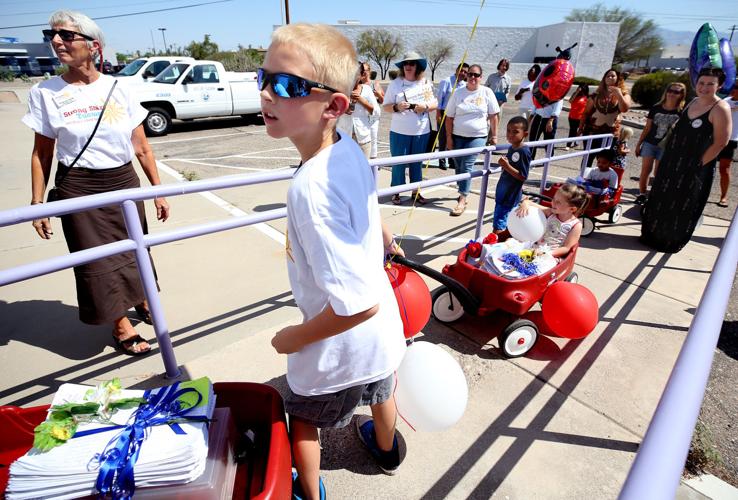J.D. Mesnard, speaker of the Arizona House, and other legislators toured promising places on Tucson’s economic landscape at the end of last week.
The group hit our booming downtown. Journeyed to Raytheon, with its impending expansion. Toured the Port of Tucson and saw its intermodal connections to Mexican trade.
In short, what they saw was encouraging. But at the same time, on Thursday, the state’s monthly employment report came out. It showed that, far from booming, the Tucson area’s employment remains moribund. In Pima County, the number of employed people actually dropped by 2,300 from September 2016 to September 2017, the state Office of Economic Opportunity reported.
That’s worrisome, and it’s all happening as we vote on whether to raise Tucson’s sales tax by 0.6 percent in two different sales-tax elections that end Nov. 7. At the same time, members of Pima County’s Board of Supervisors continue to ponder a 0.5 percent sales-tax increase to pay for road repairs.
Tucson’s sales tax, now a total of 8.6 percent, most of which is charged by the state, will rise to 9.2 percent if we pass the ballot measures that would raise money for early childhood education and for the Reid Park Zoo. It would go up to 9.7 percent if the county board or county voters approve 0.5 percent for roads.
This is actually not that far out of whack from some Arizona communities. Including the state’s 5.6 percent rate, Bisbee and Benson already have a total 9.6 percent tax on sales. Most Maricopa County cities have a total sales tax rate under 9 percent, but Buckeye, Carefree and Cave Creek each have 9.3 percent rates, while Glendale’s is 9.2 percent.
So, while Tucson’s current sales tax is not that bad — the city’s portion alone is 2.5 percent, the same as Marana and Oro Valley — we could soon place ourselves in the upper echelon of expensive Arizona locales.
That’s not the worst thing for the economy, since the money goes to beneficial purposes, but it could at least place some drag on our growth. At some point, as local sales tax rises, more people start crossing city or county boundaries in order to avoid paying higher sales taxes when they shop, especially for bigger purchases.
Or they find internet retail sites that don’t charge local sales taxes at all. In either case, local street-front businesses, the ones that keep our city lively and support our neighbors, lose customers. Commercial property goes vacant.
“Ever increasing rates are complicated by people’s easy access to avoid that,” Kevin McCarthy, president of the Arizona Tax Research Association, told me. “Main street businesses are put at an even further disadvantage.”
To that end, McCarthy and his group favor legislation that would force internet retailers to charge local taxes, the Marketplace Fairness Act. But that doesn’t exist now — online retailers must charge sales tax only if the retailer has a physical presence in the state where the customer is located.
Sales taxes also disproportionately cost the poor, who spend more of their income on taxable items than wealthier people do.
Despite all those problems with sales taxes, the state government is forcing localities toward depending on more of them.
“We’ve decided over the last 50 years to rely really heavily on sales taxes, then property taxes, then income taxes,” McCarthy said.
Our sales-tax temptations arise as Tucson is struggling to move beyond an economy based on population growth. Local leaders have recommended this for years, and now we are there: Population growth is slow. But we haven’t replaced construction work and other growth-related jobs with new industries.
Maricopa County, in contrast, remains buoyed by population growth, even as other industries such as financial-services firms move in, said Lee McPheters, economist at ASU’s W.P. Carey School of Business. A disproportionately high amount of the state’s economic and population growth remains in metro Phoenix.
In Tucson, some good news lately has shown that efforts at moving past growth-related industries are starting to work. Caterpillar has opened a division headquarters here, Hexagon Mining is expanding and moving downtown, Vector Space Systems and World View Enterprises are sending vehicles into space or near-space, Raytheon Missile Systems is adding jobs by the thousands.
But, as Rep. Todd Clodfelter, a Tucson Republican who helped lead the touring group said, what that means is that “the outlook is improving” but we’re not there yet.
So what happens when we throw an extra 0.5 or 0.6 percent sales tax on top of our existing 8.6 percent? And how about a possible additional 0.5 percent sales tax for roads by the county? Put together, it wouldn’t be a disastrous effect, but I suspect it would extend our continued slow economic emergence.
I’m not saying I won’t vote for any sales-tax increases. But when I cast my ballot, I will be thinking about our economic malaise and what will help us escape it.




